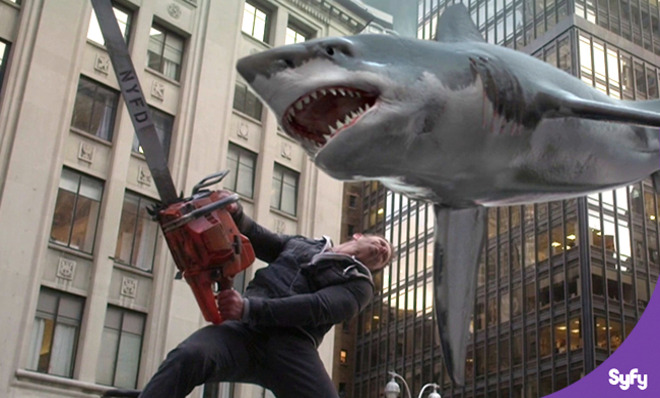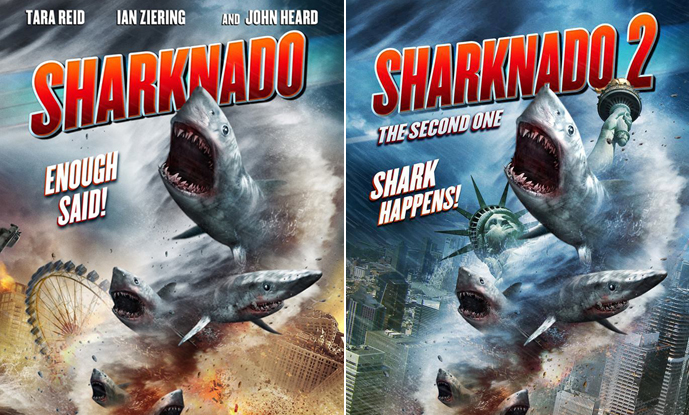Sharknado isn't just stupid. It's bad for cinema.
Will our fixation with "so-bad-it's-good" lead to anything but more trash?

A free daily email with the biggest news stories of the day – and the best features from TheWeek.com
You are now subscribed
Your newsletter sign-up was successful
This week, an event of catastrophic proportions occurred. No, New York City wasn't actually ravaged by a series of freak tornadoes full of deadly, man-eating sharks. Instead, the internet was ravaged by the millions of people who watched SyFy's trashy made-for-TV sequel Sharknado 2: The Second One.
I'm not trying to be a killjoy. In theory, this sounds like a fun premise for a so-bad-it's-good movie, in the vein of cult classics like The Room, Miami Connection, and Troll 2. But there's an important difference between accidentally bad movies and purposefully bad movies. And that distinction is why Sharknado and Sharknado 2: The Second One aren't just trashy movies — they're harmful to cinema as a whole.
In her seminal essay, "Trash, Art, and The Movies," Pauline Kael defended pulpy movies like Franklin J. Schaffner's The Planet of the Apes. She argued that there's no harm in watching films that we know don't have artistic value because, even as we watch them for sheer entertainment, they'll eventually lead us to crave better art. "Trash has given us a taste for art," she wrote.
The Week
Escape your echo chamber. Get the facts behind the news, plus analysis from multiple perspectives.

Sign up for The Week's Free Newsletters
From our morning news briefing to a weekly Good News Newsletter, get the best of The Week delivered directly to your inbox.
From our morning news briefing to a weekly Good News Newsletter, get the best of The Week delivered directly to your inbox.
But if Kael were alive today to see the frenzied reception that greeted Sharknado and its sequel, she might retool her thesis.
There is no doubt that Sharknado is at the center of American pop culture right now. On the night of the sequel's broadcast, #Sharknado2TheSecondOne was the top trending hashtag on Twitter in all of the U.S. Bars and restaurants hosted official watch parties. SyFy teamed with more than 45 partners to offer Sharknado merchandise. Sharknado fever is real, and with another sequel already on the horizon, it certainly won't be the last we'll hear of it.

Last year, Flavorwire's Jason Bailey argued that Sharknado is bad for people who love bad movies. "For those of us with a genuine love for bad movies, who seek out treasures of terribleness," he wrote, "the Sharknado social media storm was kind of like when everybody discovered rap music via Vanilla Ice." Bailey made the case that the appeal of so-bad-they're-good gems like Manos, Miami Connection, or The Room is that they weren't deliberately manufactured to be bad. Those cult hits came from people who truly believed they were making good art, and the gulf between their visions and the reality of their work was what made them enjoyable. The same cannot be said of the Sharknado films — "a plastic, artificial, manufactured substitute" made with "snickering, ironic snark-viewing in mind," Bailey wrote.
But that doesn't get to the bottom of why Sharknado is so pernicious. Imagine that you're a top Hollywood executive — the kind that calls shots and greenlights projects. If you're searching for the Next Great Box Office Smash Hit — especially one that's cheap and likely to put butts in seats — you'd be crazy not to see the cultural phenomenon of Sharknado as an instant money-making opportunity. Hire some washed-out, B-movie stars on the cheap; attach a no-name director; commission a hastily written screenplay; and don't break the bank on your cheesy, cheap special effects. If it's half as successful as Sharknado, it's a recipe for some serious cash money.
A free daily email with the biggest news stories of the day – and the best features from TheWeek.com
But what kind of precedent does that set? If studios succeed by making bad movies, other studios will follow suit. Social media buzz becomes more important to Hollywood every year, and it won't take many more Sharknados before studios, filmmakers, and writers race to the bottom, creating terrible lowbrow art for the sake of irony (the one thing that we do not need more of these days).
Like eating a Twinkie every once in a while, watching a Sharknado-style D-movie every now and again isn't going to kill cinema. But the cultural worship that surrounds Sharknado is a troubling omen of where Hollywood is heading. Trashy movies like Sharknado and Sharknado 2: The Second One don't give us a taste for art — they give us a taste for more trash.
Matt is an arts journalist and freelance writer based in Washington, D.C. He has written about film, music, and pop culture for publications including Washington City Paper, The American Interest, Slant Magazine, DCist, and others. He is a member of the Washington D.C. Film Critics Association.
-
 The ‘ravenous’ demand for Cornish minerals
The ‘ravenous’ demand for Cornish mineralsUnder the Radar Growing need for critical minerals to power tech has intensified ‘appetite’ for lithium, which could be a ‘huge boon’ for local economy
-
 Why are election experts taking Trump’s midterm threats seriously?
Why are election experts taking Trump’s midterm threats seriously?IN THE SPOTLIGHT As the president muses about polling place deployments and a centralized electoral system aimed at one-party control, lawmakers are taking this administration at its word
-
 ‘Restaurateurs have become millionaires’
‘Restaurateurs have become millionaires’Instant Opinion Opinion, comment and editorials of the day